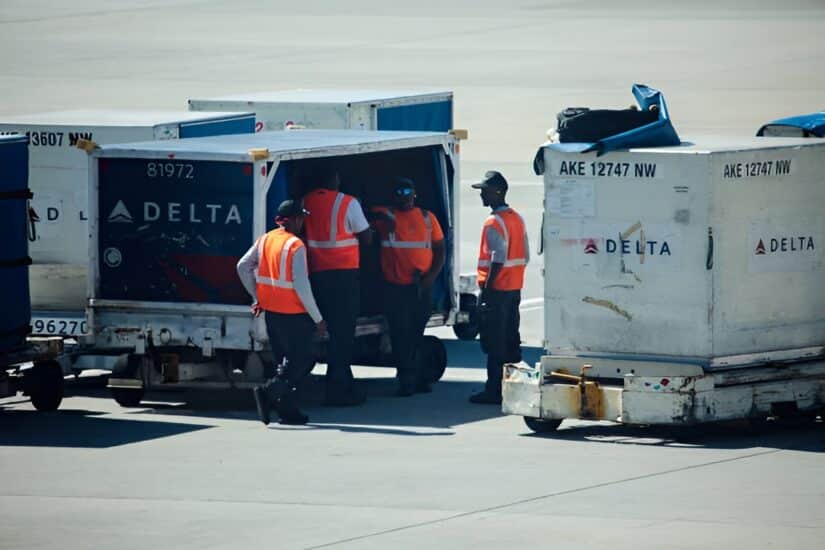
Georgia airports are some of the busiest in the United States. With Hartsfield-Jackson Atlanta International Airport and Atlanta Airport handling millions of passengers each year, the workload on airline workers, maintenance staff, flight attendants, and first responders is enormous. Unfortunately, this constant activity creates serious risks of workplace injuries and airport injuries that can leave employees facing medical bills, lost wages, and long recoveries.
This blog explores the causes of work-related injuries in Georgia airports, the impact of Georgia workers’ compensation laws, common injury types such as traumatic brain injuries, spinal cord injuries, and repetitive motion injuries, and how workers can protect themselves.
The Scope of Airport Work in Georgia
Airports are hubs of activity, relying on thousands of employees. From Delta Air Lines, American Airlines, and Southwest Airlines to smaller carriers like Piedmont Airlines, employees handle luggage, maintain aircraft, fuel planes, and ensure passenger safety. These duties expose them to risks that lead to Airport Personal Injuries, Slip-and-fall injuries, and even fatal work injuries.
Georgia airports also include facilities such as Savannah/Hilton Head International Airport and connections to regional transport hubs. With large employers like airline companies, airport management, and security companies, workers face hazards daily.
Common Types of Airport Work Injuries
1. Baggage Handling and Heavy Lifting
Baggage handlers often suffer from musculoskeletal injuries, repetitive use injuries, and carpal tunnel syndrome. Constant lifting without proper equipment can lead to knee injuries or even a catastrophic injury that ends a worker’s career.
2. Slips, Trips, and Falls
Slip and fall accidents are among the most common airport injuries. Wet floors, cluttered walkways, and busy terminals make Slip-and-fall injuries frequent. These often result in brain injuries, traumatic brain injuries, or brain and head injuries that require extensive treatment and generate high medical expenses.
3. Vehicle and Equipment Accidents
Ground crews and maintenance crews work near tugs, carts, and fueling vehicles. Collisions have resulted in spinal cord injuries, property damage, and even fatal work injuries.
4. Repetitive Stress Injuries
Jobs such as scanning luggage or working in a maintenance facility often cause repetitive motion injuries and repetitive use injuries. Over time, these can worsen into long-term conditions covered under the Georgia workers’ compensation system.
5. Security and Passenger-Related Incidents
Flight attendants, TSA officers, and security companies deal with passengers daily. Confrontations, heavy bag checks, and long shifts increase the risk of work-related injuries and personal injury cases.
The Legal Framework for Georgia Airport Workers
Workers’ Compensation in Georgia
Georgia requires most employers to carry workers’ compensation insurance. Under Georgia law, this system provides benefits for medical coverage, treatment of medical debt, and partial wage replacement for lost wages.
Important aspects include:
- The Workers’ Compensation Act governs claims.
- The Georgia State Board of Workers’ Compensation manages filings.
- Workers Compensation and worker’s compensation terms are interchangeable but mean the same coverage.
- Injured employees may consult workers’ compensation lawyers or Atlanta workers’ compensation attorneys to navigate disputes.
- Some cases fall under Workers’ Compensation Cases, which address disputes about benefits.
Premises and Third-Party Liability
Sometimes, Georgia’s premises liability laws and premises liability apply if unsafe conditions at airports lead to Airport Personal Injuries. For example, a passenger or employee injured on International Boulevard may file a third-party liability claim if negligence is proven.
Compensation and Recovery
Medical Costs
After airport injuries, employees often face rising medical bills, medical debt, and ongoing medical expenses. Properly documented medical records and access to medical teams or medical crews are critical for claims.
Wage Replacement and Damages
Workers may claim compensation for lost wages, pain and suffering, and in some cases, property damage. A personal injury claim or personal injury lawsuit may also arise alongside Georgia Workers’ Compensation filings.
Serious and Catastrophic Injuries
Severe catastrophic injury, including spinal cord injuries, traumatic brain injuries, or permanent disability, may justify additional claims beyond standard workers’ compensation laws.
Airlines and Their Role in Worker Safety
Major airline companies like Delta Airlines, Delta Air Lines, American Airlines, and Southwest Airlines employ thousands at Hartsfield-Jackson International Airport and Hartsfield-Jackson Atlanta International. These employers are expected to follow Occupational Safety and Health Administration guidelines to protect maintenance staff, maintenance crews, and other employees from fatal work injuries and workplace injuries.
Unions like the International Association of Machinists and Aerospace Workers advocate for better conditions, while organizations such as Airports Council International push for global safety standards.
Why Airport Injury Claims Are Complex
Airport injuries often involve multiple entities, including airport management, airline companies, and contractors. Proving responsibility sometimes requires surveillance footage, documentation like the First Report of Injury, and analysis of medical records.
Some cases even involve cross-state comparisons, such as with Charlotte Douglas International Airport, when policies differ.
Steps to Take After an Airport Work Injury
- File a First Report of Injury with your employer.
- Seek medical treatment and keep medical records.
- Collect evidence, including surveillance footage and witness accounts.
- File with the Georgia State Board of Workers’ Compensation.
- Consult with workers’ compensation lawyers or personal injury attorneys if disputes arise.
Human Costs of Airport Injuries
Behind the legal terms are real people:
- Flight attendants with brain injuries who cannot return to flying.
- Maintenance staff with spinal cord injuries who face lifelong disability.
- Families burdened with medical debt and struggling with pain and suffering.
These are more than statistics. They represent personal injury cases that affect Georgia families every day.
Conclusion
Airport work is vital to Georgia’s economy and global connectivity, but it comes with risks of Airport Personal Injuries, workplace injuries, and work-related injuries. From slip and fall incidents at Hartsfield-Jackson Atlanta International Airport to repetitive strain problems in a maintenance facility, workers deserve protection under Georgia workers’ compensation laws and the Workers’ Compensation Act.
Knowing your rights and taking the right steps after airport injuries ensures better outcomes. Whether dealing with medical bills, filing for lost wages, or pursuing a personal injury claim, staying informed is key.
About Ted Law firm
At Ted Law Firm, supports individuals and families across Georgia and South Carolina who are impacted by airport injuries, workplace injuries, and other personal injury cases. We proudly represent injury victims throughout Georgia, including Atlanta, Athens, Savannah, Columbus, Warner Robins, and Macon.Known for its commitment to workers, Ted Law ensures every voice is heard and every claim receives fair attention under Georgia workers’ compensation laws.Contact us today for a free consultation
